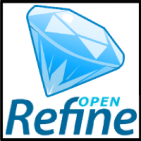 See what new science books have been recently added to the Geology-Physics-Math and Langsam Libraries.
See what new science books have been recently added to the Geology-Physics-Math and Langsam Libraries.
Click here to access the July-August 2017 list.

 See what new science books have been recently added to the Geology-Physics-Math and Langsam Libraries.
See what new science books have been recently added to the Geology-Physics-Math and Langsam Libraries.
Click here to access the July-August 2017 list.
UC Libraries is pleased to offer a new data science workshop this fall on OpenRefine. Join us in 850D Baldwin Hall (CEAS Library classroom) on Tuesday, October 31 from 10:00am – 12:00pm. Register here (Central Login required).
 OpenRefine, http://openrefine.org, is a free, powerful, and easy-to-use tool for cleaning up and transforming datasets in order to prepare them for analysis and sharing. In this workshop, you will learn how to leverage OpenRefine’s interface and scripting language for basic data exploration and bulk transformations. No prior knowledge necessary. Please bring your own laptop for the hands-on exercises.
OpenRefine, http://openrefine.org, is a free, powerful, and easy-to-use tool for cleaning up and transforming datasets in order to prepare them for analysis and sharing. In this workshop, you will learn how to leverage OpenRefine’s interface and scripting language for basic data exploration and bulk transformations. No prior knowledge necessary. Please bring your own laptop for the hands-on exercises.
Contact Ted Baldwin with questions, Ted.Baldwin@uc.edu .
Posted on Behalf of Jane Combs – combsje@uc.edu.
The Ohio Supercomputer Center will offer two workshops on its resources and how to use them Tuesday, October 10, on both East and West campuses.
IT@UC Research & Development will be hosting the Ohio Supercomputer Center for two workshops on Tuesday, October 10. The morning workshop will provide an introduction to the Ohio Supercomputer Center resources and how to use them. In the afternoon, the workshop will cover Big Data Analytics and Spark.
Register for the workshops HERE
The Ohio Supercomputer Center, headquartered in Columbus, partners with Ohio researchers to develop proposals to funding organizations and is the state’s leading strategic research group.
 UC Libraries will be closed Monday, September 4 for Labor Day, except for the Donald C. Harrison Health Sciences Library, which will be open 9am-5pm. This closing includes the Langsam Library 4th floor space, which will close Sunday, September 3 at 11pm and re-open Tuesday, September 5 at 7:45am.
UC Libraries will be closed Monday, September 4 for Labor Day, except for the Donald C. Harrison Health Sciences Library, which will be open 9am-5pm. This closing includes the Langsam Library 4th floor space, which will close Sunday, September 3 at 11pm and re-open Tuesday, September 5 at 7:45am.
A complete listing of library hours can be found online at www.libraries.uc.edu/about/hours.html.
Enjoy the long holiday weekend.
GIS stands for Geographic Information Systems. GIS has applications for both teaching and research across many disciplines.
Do you need to visualize your spatial data but don’t know how? Do you have spatial data but don’t know how to map it? Are you looking for guidance or have expertise to share regarding the analysis of spatial data? Are you an ArcGIS, Q-GIS or other GIS program user and want to connect with other people who use these programs? Are you simply curious about GIS and want to learn more?
The GIS Learning Community can help you address these and other questions. The goal of the community is to be a user-driven forum for novice and expert practitioners to come together and discuss tools, resources, projects and solutions surrounding the spatial aspects of their data. We invite interested individuals across all of UC to join us in building this community. The community is open to All Faculty, Staff and Students, as well as interested parties from outside of UC. Please share with your colleagues and students.
The Details –
Date: September 6, 2017
Time: 3:00 to 4:30 pm
Place: (VENUE CHANGE 480 Langsam)
Light refreshments will be served
RSVP and Join the GIS LC at https://form.jotform.us/72324913145149.
If you are interested in the GIS Learning Community and are not able to come to the first meeting, RSVP or email ASKGIS@UC.Edu to be added to the GIS LC email list. Future invites will go to the GIS LC email list only.
More information is available on the GIS LC page on the GIS research guide: http://guides.libraries.uc.edu/GIS/GISLC
The University of Cincinnati Libraries and the Graduate School are pleased to host the Center for Open Science for a workshop on “Increasing Openness and Reproducibility in Quantitative Research” on Wednesday, Oct. 25. The workshop will cover project documentation, version control, pre-analysis plans and the Open Science Framework.
There will be two duplicate sessions of the workshop, one on the Medical Campus from 9 a.m. to noon and one on the West Campus from 1:30 to 4:30 p.m. The event is free and open to all. To register, visit https://goo.gl/Hf5neh. Participants should bring their own devices for the best workshop experience.
The Open Science Framework (OSF) is an open-source workflow management tool developed by the Center for Open Science. Appropriate for any discipline, OSF enables researchers to manage workflows, share files, view project analytics, and more. Available at osf.uc.edu, OSF for UC is the portal for students, faculty, staff and others to manage project files and documents. There is no cost to use OSF and sign-in is easy. Simply go to osf.uc.edu, click on the sign in button, choose University of Cincinnati, then enter your UC 6+2 Central Login.
Workshop Information:
Date: Oct. 25, 2017
Session 1
Time: 9 a.m.-noon
Location: Medical Campus – Troup Learning Space, Donald C. Harrison Health Sciences Library – MSB G005G
Session 2
Time: 1:30-4:30 p.m.
Location: West Campus – 480 Walter C. Langsam Library
Questions? E-mail Amy Koshoffer, science informationist, at ASKDATA@UC.EDU for more information.
See what new science books have been recently added to the Geology-Physics-Math and Langsam Libraries.
Click here to access the May-June 2017 list.
UC Libraries now has a subscription to ASTM Compass, which includes all ASTM standards, journals and STPs (Special Technical Publications). Access to standards includes both current and historical versions.
ASTM standards and publications cover many topics: consumer products, science, design, architecture, engineering, 3D printing, medical devices, etc. Go to https://www.astm.org/Standards/category_index.html to see an entire list of standards by category.
To access go to https://compass.astm.org/CUSTOMERS/index.html . If you are off-campus, log in to the UC VPN: http://libraries.uc.edu/off-campus-access.html
Some help using the COMPASS platform:
IT@UC is hosting the OSC for two live streaming webinars
JULY 20: BIG DATA @ OSC Workshop: INTRO TO HADOOP & SPARK
Date: Thursday, July 20, 2017 – 1:00 pm to 4:00 pm
Streaming Location: Langsam 475
REGISTER ONLINE (click yes to – Select if attending the remote event at University of Cincinnati)
JULY 27: PERFORMANCE TUNING WORKSHOP
Date: Thursday, July 27, 2017 – 1:00 pm to 4:00 pm
Location: 850D Baldwin Hall (CEAS Library)
REGISTER ONLINE (click yes to – Select if attending the remote event at University of Cincinnati)
These are live webex events. Brett Kottmann will
be on site. Questions? brett.kottmann@uc.edu
Attached: OSC webcast ad flyer V2_201707
The hours for the Data & GIS Collab (located in the Geo-Math Physics library in Braunstein Hall) for the dates Friday July 7th to Monday July 17th will be as follows:
Friday July 7th the consult hours will be 10 am to 2 pm
There will be no consult hours from Monday July 10th through Monday July 17th. On July 18th the normal schedule will resume.
During these times, both workstations will be available for self directed public use.
This information will also be on the campus guide: http://guides.libraries.uc.edu/GIS/CollabInfo
Email ASKGIS@UC.Edu with questions